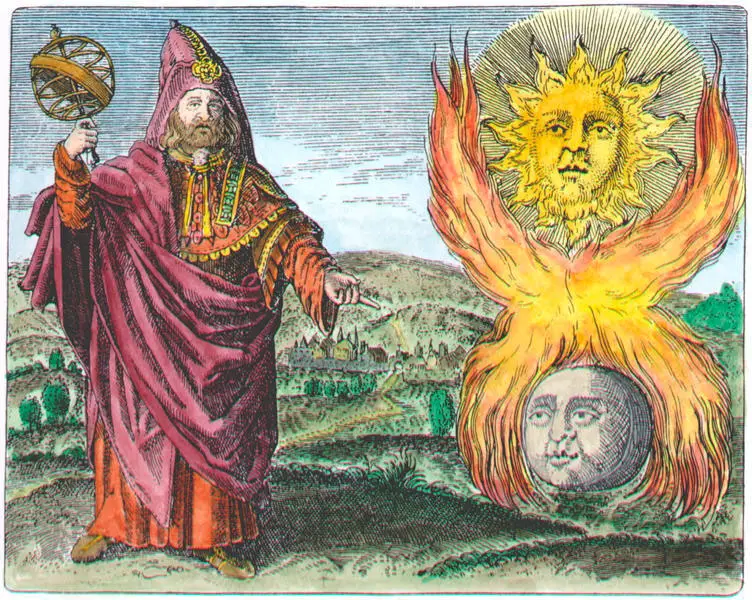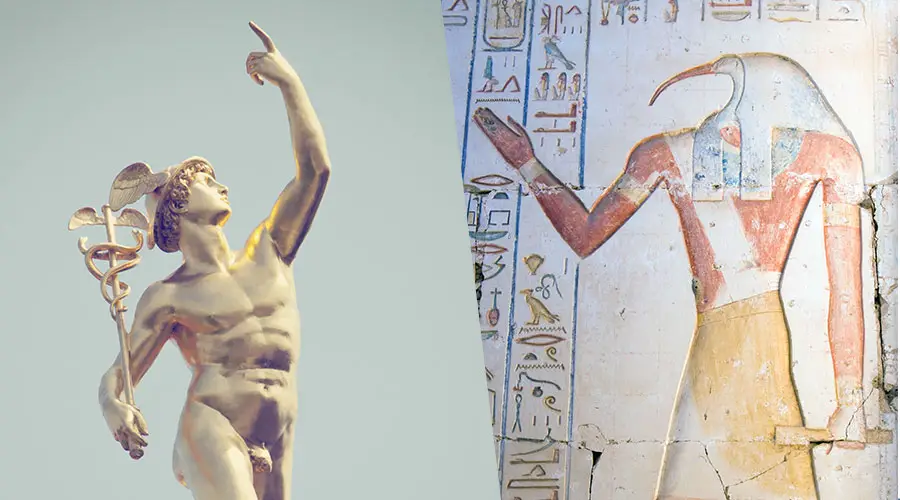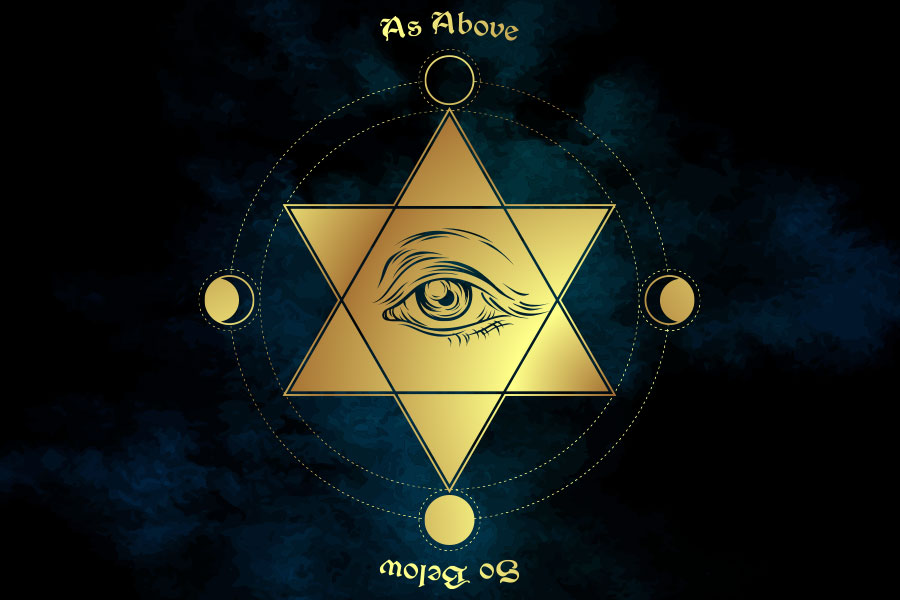Hermes Trismegistus is an important figure in the history of philosophy and science, and is known for the legacy of writings that are attributed to him.
Hermes Trismegistus is a combination of Thoth and Hermes, which emerged during the Hellenistic era. Known as “Thrice Great”, he created Hermeticism, including alchemy, wrote the Emerald Tablets, which has the phrase “As Above, So Below”, and influenced Leonardi and the Rosicrucians, amongst others.

Here are 10 things Hermes Trismegistus is Known For:
1: Hermes Trismegistus is considered the Founder of Science, Religion, and Philosophy
Amongst those who study the body of literary work left by Hermes Trismegistus, he is regarded as the figure responsible for introducing science and religion to the world, as well as math and geometry, medicine and magic. His disciples became the priests of ancient Egypt, and he taught Pythagoras and other early Greek philosphers.
2: Hermes Trismegistus is a Syncretic Combination of Thoth and Hermes
In 305 BC the Ptolemaic Kingdom was founded in Egypt by the Greeks. During this time the two cultures became intermingled, and as the Greeks practiced a habit of studying the gods of other cultures and determining the equivalent in their own cosmology, it was determined that the Egyptian god Thoth was the same being as their god Hermes. As a result, the name Hermes Trismegistus started being used to describe the god who was both Thoth and Hermes. You can read more about the combining of the two deities here.

3: Hermes Trismegistus Rose to Prominence during the Hellenistic Period
The period of history between the death of Alexander the Great in 323 BC and the beginning of the Roman Empire in 31 BC is called the Hellenistic period, and it was during this time Hermes Trismegistus became a highly regarded figure. The conquests of Alexander meant that Greek culture fused with many other Mediterranean cultures. It was also a time of great interest in philosophy and science.
4: Hermes Trismegistus is called “Thrice Great”
The syncretic combination of Hermes and Thoth was regarded as the fountain of wisdom, and the master of masters during the Hellenistic period. The name Hermes Trismegistus means “thrice great”, a phrase that is also often used to describe him. It has been interpreted to mean that he knows the three parts of the universe, which are alchemy, astrology, and theurgy. Another understanding is that he is called Thrice Great because he is the greatest philosopher, the greatest priest, and the greatest king.
5: Hermes Trismegistus Wrote the Famous Phrase “As Above, So Below”
The famous phrase was originally written by Hermes Trismegistus in the second verse of the Emerald Tablets. It describes the Principle of Correspondence, which is one of the 7 Hermetic Principles. It describes how there are infinite planes of reality which reflect each other, and what is true on one is also true on others. You can read more about the famous phrase here.

6: Hermes Trismegistus is the Founder of Alchemy
The practice of alchemy has the aim of turning base metals such as lead into gold. A precursor to modern chemistry, alchemists work in labs and believe that with a magical substance called the Philosopher’s Stone they can achieve this transformation. There is a deeper meaning as well, as turning lead into gold is a metaphor for the liberation of the human spirit. Hermes introduced alchemy into the world and his writings are the reference for alchemists. You can read more about Alchemy here.
7: Hermes Trismegistus is the Author of Corpus Hermeticum
It is believed that he actually wrote thousands of books, most of which were destroyed in the burning of the Library of Alexandria. Of the small body of literature that remains and is attributed to them, one of the most important books is called Corpus Hermeticum. It is a collection of various different writings, and was compiled during the medieval ages. It is mostly presented in the form of dialogues, and discusses the divine, mind, nature, and cosmology.
8: Hermes Trismegistus Created the Emerald Tablets
The Emerald Tablets are mythical slabs of rock that contain writings that Hermes created during his time as the king and high priest of Atlantis. The actual physical slabs have been lost, and there is no official evidence that they ever did exist. They have been described as being made out of a magical substance which is impossible to break. Although the tablets seem to have been lost, translations emerged during the 8th century, written in Arabic. It consists of 12 chapters and describes alchemical principles of transformation, and the Philosopher’s Stone, which is the magical substance alchemists require in order to turn lead into gold. You can read more about the Emerald Tablets here.
9: The teachings of Hermes Trismegistus have been studied by the Rosicrucians and the Hermetic Order of the Golden Dawn
Amongst those who have found and studied the teachings left by Hermes Trismegistus, there are notable organizations, whom have often been secretive in nature. Amongst the most well-known groups are the Rosicrucians. The group is a brotherhood dedicated to esoteric knowledge, and was founded in 1313, and today exists as world-wide movement.
The Hermetic Order of the Golden Dawn is another secret society which studies Hermeticism, and was founded in 1887. It is headquartered in London, England, and was founded by Free Masons. It practices a system of initiation and hierarchy, and its membership has included many well-known occult figures such as Alistair Crowley. You can read more about the influence of Hermeticism and Alistair Crowley here.
10: Hermes Trismegistus Influenced Famous Thinkers like Isaac Newton and Leonardo De Vinci
The legacy of wisdom left by Hermes Trismegistus has been highly influential on many other important thinkers throughout history. Notably Leonardo De Vinci was a lifelong student of Hermeticism. Corpus Hermeticum was translated to Latin in the 15th century, and was hugely influential in the development of the Italian Renaissance in general, and particularly on De Vinci, whose study of esoteric concepts were found in his private journals.
Also Isaac Newton, the mathematician and scientist who is perhaps the most influential thinker on modern science practiced alchemy, and was a member of secret societies dedicated to studying Hermeticism.

Recommended Reading
If you want to continue exploring this subject more deeply, you can see which books I recommend by clicking here.
